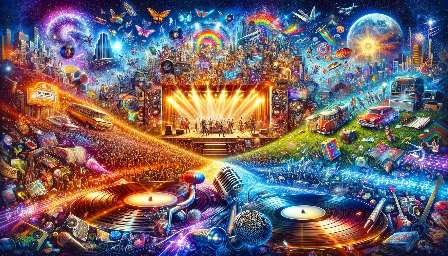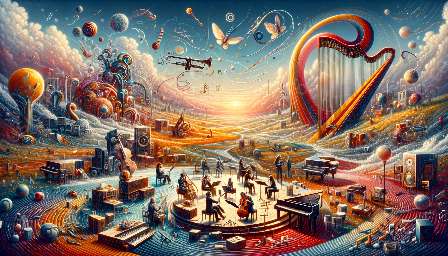Electronic music has transformed the music industry, ushering in an era of digital innovation and creativity. The challenges and opportunities for electronic music in the digital age are intricately linked to its historical evolution and the broader history of music.
The History of Electronic Music
Electronic music has a rich and diverse history that spans over a century, marked by significant technological advancements and artistic experimentation. The origins of electronic music can be traced back to the late 19th and early 20th centuries, with the invention and development of electronic musical instruments such as the Telharmonium and the Theremin.
The introduction of electronic instruments paved the way for the emergence of avant-garde composers and artists who sought to explore new sonic possibilities. Early pioneers such as Karlheinz Stockhausen, Pierre Schaeffer, and Wendy Carlos played pivotal roles in shaping the trajectory of electronic music, pushing boundaries and challenging traditional notions of composition and performance.
The Impact of Electronic Music
Electronic music's influence on the broader music landscape cannot be overstated. The advent of synthesizers, drum machines, and digital recording technologies revolutionized music production, enabling artists to create sounds that were previously unimaginable. Genres like techno, house, and ambient emerged from the underground scene and eventually permeated mainstream culture, reshaping popular music and club culture.
Furthermore, electronic music has significantly impacted the way music is consumed and distributed. The rise of digital platforms and streaming services has democratized the production and dissemination of music, allowing independent and electronic artists to reach global audiences with unprecedented ease.
Challenges in the Digital Age
Despite the immense opportunities afforded by digital technologies, electronic music faces its fair share of challenges in the digital age. One of the key challenges is the oversaturation of the market, driven by the accessibility of production tools and distribution channels. With a vast amount of music being created and released daily, standing out in a crowded digital landscape becomes increasingly difficult for emerging artists.
Moreover, the issue of copyright and intellectual property rights has become increasingly complex in the digital age. Sampling, remixing, and digital piracy present legal and ethical dilemmas that continue to shape the landscape of electronic music production and consumption.
Additionally, the rapid evolution of digital technology presents a challenge for artists to stay ahead of the curve. The constant innovation in software, hardware, and production techniques requires artists to adapt and learn continuously, which can be overwhelming and resource-intensive.
Opportunities in the Digital Age
Amidst the challenges, the digital age has also brought forth numerous opportunities for electronic music. The democratization of music production and distribution has empowered a new generation of artists to create and share their work without the need for traditional industry gatekeepers. Independent labels and artist-owned platforms have gained traction, providing a platform for diverse and experimental electronic music that may not fit within commercial norms.
Furthermore, advancements in streaming technologies and immersive multimedia experiences have expanded the possibilities for live electronic music performances. From interactive visuals to virtual reality experiences, electronic artists are pushing the boundaries of live performance, offering audiences new ways to engage with music in the digital realm.
The digital age has also facilitated global collaboration and cross-cultural exchange within the electronic music community. Artists can connect and collaborate with peers from around the world, leading to the emergence of hybrid genres and new sonic fusions that transcend geographical boundaries.
The Future of Electronic Music
Looking ahead, the future of electronic music is poised to be shaped by the ongoing convergence of technology, creativity, and cultural influences. As artificial intelligence and machine learning continue to advance, the potential for new forms of musical expression and creation is vast, challenging artists to explore the intersection of human creativity and computational intelligence.
Furthermore, the evolving landscape of virtual reality, augmented reality, and spatial audio presents exciting possibilities for immersive and interactive electronic music experiences, blurring the boundaries between physical and digital spaces.
Ultimately, the challenges and opportunities for electronic music in the digital age are deeply intertwined with its historical evolution and the broader history of music. By navigating the complexities of the digital landscape while embracing innovation and collaboration, electronic music stands to continue its transformative role in shaping the sonic and cultural landscapes of the future.




































